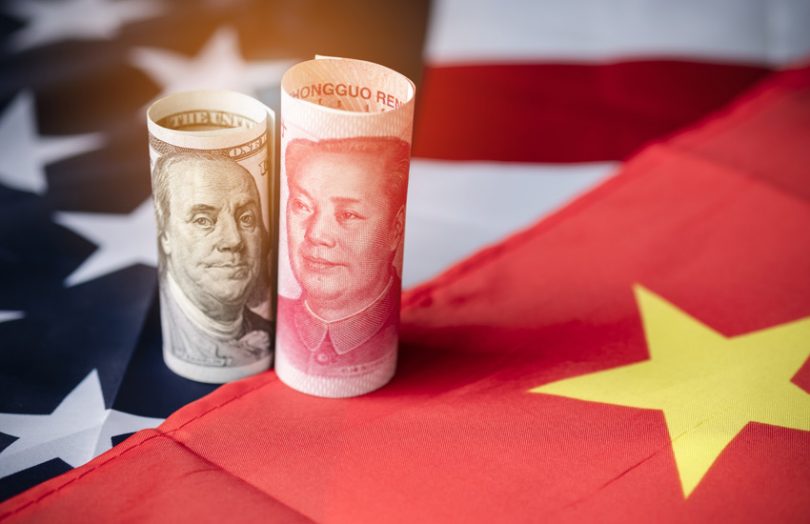Lord Mervyn King, the former Governor of the Bank of England, indirectly asserted that global use of the U.S. dollar will likely decline because some countries want to avoid using the dollar. He expressed his views as part of a hearing earlier this week on central bank digital currencies (CBDC) by the U.K.’s House of Lords Economic Affairs Committee, where he is a member.
The discussion started around how the U.S. has used the monetary system to enforce sanctions, resulting in fragmentation. The question is whether a CBDC will accelerate this.
There was a separate debate about the motivations for a CBDC. Lord King addressed the need for more retail payments competition towards Visa’s Europe CEO Charlotte Hogg.
Richard Gendal Brown, CTO of enterprise blockchain firm R3, was one of the three witnesses at the hearing. He argued that as physical cash declines, there might be a need for an anonymous cash-like digital alternative. While other providers could issue privacy-centric stablecoins, only a central bank can issue a digital pound that is anonymous, at least for small payments. At a wholesale level, a CBDC could accelerate delivery versus payment (DvP) and payment versus payment (PvP), reducing risk in the financial system.
Coming back to Lord King’s comments, we include below extensive quotes from the discussion.
The global financial system’s fragmentation
The hearing opened with a question by Lord Forsyth about whether China’s CBDC was a threat to U.S. dollar dominance globally. Tom Keatinge’s response was CBDC aside, the global financial system is already fragmenting because some countries want to operate outside the reach of the U.S. dollar.
Keatinge is a Director at the Centre for Financial Crime and Security Studies, part of U.K. defense think tank RUSI. The trigger for the fragmentation has been the use of the payment messaging system SWIFT to enforce sanctions. Certain countries are thinking, “I’m not going to sit around and basically accept the fact that the U.S. has this control over me,” observed Keatinge.
In the past 20 years, there were not many alternatives, but that’s already changing. And Keatinge sees CBDC as potentially accelerating the ability of countries to move away from the dollar. However, the U.S. Treasury appreciates that using the financial system for sanctions also weakens it as a sanctions tool in the future.
Lord King noted that the demand for fragmentation or balkanization has been evident for quite some time, and it’s not just the Treasury but also the actions of the U.S. Department for Justice. He asked, “do you think that the legal system in the U.S. is likely also to back off somewhat its extreme extraterritoriality, which is also driving balkanization?” Keatinge’s response was it’s unlikely.
A desire to sidestep SWIFT
“All the international payments in the world go through SWIFT. There’s a lot of resistance to that because of the ability of the Americans to access SWIFT,” said Lord King. “And the fact that many of those transactions are in dollars is just another reason why people would like to develop an alternative to SWIFT, and people are debating that and discussing it.”
He continued, “That seems to me the biggest threat to the current method of making payments and to the governance of that payment system, which is dominated by the G10 central banks.” He then asked how CBDC might play a role in this.
To add context, multiple groups of central banks are exploring the use of CBDC for cross border payments. The M-CBDC Bridge project includes the BIS, the People’s Bank of China (well advanced in piloting a domestic CBDC), and the central banks of the UAE, Thailand and Hong Kong.
Referring to the M-CBDC project, Keatinge responded, “It could well be exactly what you’re talking about. Another way of communicating those messages that are currently carried by SWIFT.”
King then asked, “Do you think this would lead to alternative payment systems for international payments being generated that were not being driven solely by technology. But were also being driven by what used to be called politically motivated people.”
King continued, “You know, groups of countries saying, we don’t mind having a slightly less efficient system, but no one can access it. No one knows what these payments are about.”
Keatinge’s response was that it’s very probable.
A common good
Asked what the U.K. can do about, Keatinge said, “it’s a risk countries may end up finding they have to choose: do you want to be part of the Chinese walled garden or do you want to be part of the United States walled garden?”
He continued, “And I think to some extent that’s already possibly happening. I guess I’d like to see the U.K. out there taking kind of a leadership position. The financial system should be a common good. And I think it’s become a battlefield to some extent in recent years. And I don’t think that’s good for anybody. It’s certainly not good for the United Kingdom.”






